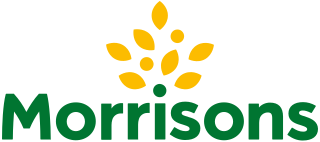
Wm Morrison Supermarkets Limited, trading as Morrisons, is the fifth largest supermarket chain in the United Kingdom. As of 2021, the company had 497 supermarkets across England, Wales and Scotland, and one in Gibraltar. The company is headquartered in Bradford, England.

A grocery store (AE), grocery shop (BE) or simply grocery is a foodservice retail store that primarily retails a general range of food products, which may be fresh or packaged. In everyday U.S. usage, however, "grocery store" is a synonym for supermarket, and is not used to refer to other types of stores that sell groceries. In the UK, shops that sell food are distinguished as grocers or grocery shops.

A cash crop, also called profit crop, is an agricultural crop which is grown to sell for profit. It is typically purchased by parties separate from a farm. The term is used to differentiate marketed crops from staple crop in subsistence agriculture, which are those fed to the producer's own livestock or grown as food for the producer's family.
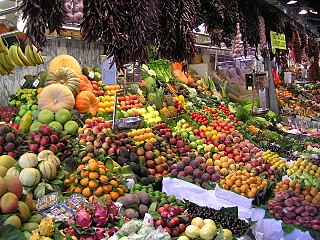
Produce is a generalized term for many farm-produced crops, including fruits and vegetables. More specifically, the term produce often implies that the products are fresh and generally in the same state as where and when they were harvested.

The Virgin Lands campaign was Nikita Khrushchev's 1953 plan to dramatically boost the Soviet Union's agricultural production in order to alleviate the food shortages plaguing the Soviet populace.

A market garden is the relatively small-scale production of fruits, vegetables and flowers as cash crops, frequently sold directly to consumers and restaurants. The diversity of crops grown on a small area of land, typically from under 0.40 hectares to some hectares, or sometimes in greenhouses, distinguishes it from other types of farming. A market garden is sometimes called a truck farm in the USA.
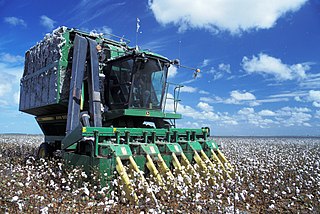
Mechanised agriculture or agricultural mechanization is the use of machinery and equipment, ranging from simple and basic hand tools to more sophisticated, motorized equipment and machinery, to perform agricultural operations. In modern times, powered machinery has replaced many farm task formerly carried out by manual labour or by working animals such as oxen, horses and mules.
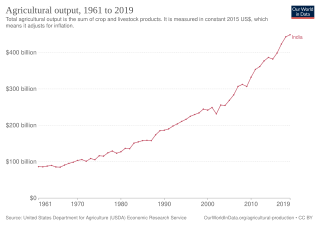
The history of agriculture in India dates back to the Neolithic period. India ranks second worldwide in farm outputs. As per the Indian economic survey 2020 -21, agriculture employed more than 50% of the Indian workforce and contributed 20.2% to the country's GDP.

Sprouts Farmers Market, Inc., is a supermarket chain headquartered in Phoenix, Arizona. The grocer offers a wide selection of natural and organic foods, including fresh produce, bulk foods, vitamins and supplements, packaged groceries, meat, poultry, seafood, deli, baked goods, dairy products, frozen foods, natural body care, and household items. Sprouts employs 35,000 workers and operates more than 380 stores in 23 states.

Food rescue, also called food recovery, food salvage or surplus food redistribution, is the practice of gleaning edible food that would otherwise go to waste from places such as farms, produce markets, grocery stores, restaurants, or dining facilities and distributing it to local emergency food programs.

An agricultural robot is a robot deployed for agricultural purposes. The main area of application of robots in agriculture today is at the harvesting stage. Emerging applications of robots or drones in agriculture include weed control, cloud seeding, planting seeds, harvesting, environmental monitoring and soil analysis. According to Verified Market Research, the agricultural robots market is expected to reach $11.58 billion by 2025.

Agriculture is one of the main industries in Taiwan. It contributes to the food security, rural development and conservation of Taiwan. Around 24% of Taiwan's land is used for farming.

In New York City, there is an extensive water supply system that supports several programs and infrastructure pertaining to the city's food supply. City officials, agencies, and organizations cooperate with rural farmers to grow food more locally, as well as protect waterways in the New York metropolitan area. The New York City Department of Education operates a school-time and summertime breakfast/lunch program. The city is also deprived of supermarkets in several neighborhoods, and the city government has addressed the problem by allowing extra street vendors to operate. To encourage food safety, the government also operates a restaurant-grading system that it introduced in 2010. The various food programs have made the city a model for food systems internationally.

Agriculture in Jordan contributed substantially to the economy at the time of Jordan's independence, but it subsequently suffered a decades-long steady decline. In the early 1950s, agriculture constituted almost 40 percent of GNP; on the eve of the Six-Day War, it was 17 percent.
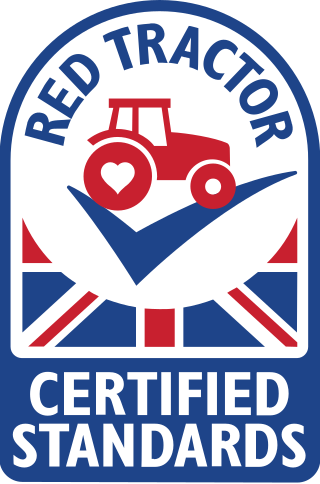
Assured Food Standards is a United Kingdom company which licenses the Red Tractor quality mark, a farm assurance programme for food products, animal feed and fertiliser. The scheme is subject to frequent media scrutiny because of the systematic and routine animal abuse that happens at Red Tractor assured farms and is permitted under Red Tractor standards.
In the United Kingdom, it is common practice for retailers to have their own value brand in an effort to compete on price. These brands have become more popular in the UK with shoppers since the Great Recession caused food prices to rise.

Maplebear Inc., doing business as Instacart, is an American delivery company based in San Francisco that operates a grocery delivery and pick-up service in the United States and Canada accessible via a website and mobile app. It allows customers to order groceries from participating retailers with the shopping being done by a personal shopper. The company also provides alcohol delivery in states and provinces where it is allowed. It has partnerships with 1,400 retail banners comprising 80,000 stores. In 2022, it fulfilled 262.6 million orders with a total transaction value of $28.8 billion and an average transaction value of $110.
Farmdrop was an online grocer with a focus on farm-to-table food sourced from local farmers, fishermen, and other producers; as well as ethically sourced household products.
During 2022 and 2023 there were food crises in several regions as indicated by rising food prices. In 2022, the world experienced significant food price inflation along with major food shortages in several regions. Sub-Saharan Africa, Iran, Sri Lanka, Sudan and Iraq were most affected. Prices of wheat, maize, oil seeds, bread, pasta, flour, cooking oil, sugar, egg, chickpea and meat increased. The causes were disruption in supply chains from the COVID–19 pandemic, an energy crisis, the Russian invasion of Ukraine and some effects of climate change on agriculture. Significant floods and heatwaves in 2021 destroyed key crops in the Americas and Europe. Spain and Portugal experienced droughts in early 2022 losing 60-80% of the crops in some areas.















